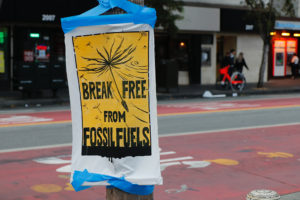Leave No One Behind in the Transition Away from Fossil Fuels
 Photo by Eelco Böhtlingk on Unsplash
Photo by Eelco Böhtlingk on Unsplash Yesterday Joe Biden was inaugurated as the 46th president of the United States. Over the last few weeks, this coming transition has been referred to as an inflection point for the country. This moment has offered hope for some. Those involved in the energy sector who are focused on climate change also see this inauguration—coupled with the new year—as a turning point in achieving net-zero emissions globally.
This week, The New York Times Climate Hub hosted a virtual discussion, “Making 2021 the Year We Break Fossil Fuel Addiction.” The panelists, hailing globally from energy companies to student organizations, discussed and debated how best to stop the inertia surrounding the use of fossil fuels and mobilize the push towards renewable energies.
During the debate, there was wide agreement on where to go from our current heavy reliance on fossil fuels. Each panelist built off the last, illustrating that climate change is a multifaceted issue that needs diverse input to work towards diverse solutions.
Climate change is a complex issue with a complex list of challenges. Perhaps first among these is the massive contaminants that fossil fuels introduce into the atmosphere. Jessica Matthews, founder and CEO of Uncharted Power, highlighted that there is not a unilateral solution to deconstructing the fossil fuel industry and building the renewable energy sector, but many solutions that need to work in an integrated fashion. This complex system of solutions must have a foundation rooted in communities, Meredith Adler executive director of Student Energy, commented. Adding that community-based movements are often powered by the young people embedded in their communities, but they cannot do it alone.
Perhaps readers will recognize the names Isra Hirsi, Greta Thunberg, or Xiuhtezcatl Martinez. These climate activists are amplifying young peoples’ voices in the fight to make climate action a priority for those in power. In the Times debate, Adler reflected on how the phrase often used by those in the youth climate movement, “the kids got this,” doesn’t hold true in society because “the kids” need the power and agency that adults in the workforce and government possess to make a change. Transitioning to renewable energy starts with and is driven by all parts of communities working hand-in-hand to achieve that goal. Adler added that the goal of transitioning to renewable energy will not function or be successful without addressing, confronting, and acting on social, racial, and economic justice.
In the intention to reach full transition away from fossil fuels, there was a consensus among all panelists that no person should be left behind. The fossil fuel industry is rooted in many American’s lives. There are many jobs and plenty of money in the industry , but as the panelists pointed out, there are more of both in renewable energies. The panelists commented that the economic appeal exists, but it is often refused. It’s understandable that people resist change when the system works in their favor, but changes in climate policy cannot be resisted. That impulse truly isn’t working in anyone’s favor. As the panelists reinforced, for the transition away from fossil fuels to succeed, people currently involved in the fossil fuels industry can not be left behind. The panelists thoughtfully pointed out that whether it is through training or educational programs, jobs and the economy can survive this transition, and even grow, away from fossil fuels.
Near the end of the event David Harvey, CEO of Ørsted Offshore North America , speaking from what he termed a “realist” point of view, said that the full transition to renewable energy is not an attainable goal for 2021. Matthew’s rebuttal to this statement embraced the reality of this issue as the life-or-death situation that it actually is. The transition away from fossil fuels and towards renewable energy must be confronted with the utmost urgency from all communities, with a wide breadth of solutions, and everybody included in the equation.
The American Humanist Association’s (AHA’s) Resolution on Climate Change states, “As humanists, we understand that only humans can save ourselves from the climate crises we have created.” Work toward achieving net zero global emissions requires us all to take ownership of the environmental chaos humans have caused.
The New York Times Climate Hub has uploaded the full debate to its website, which you can watch here.
On Thursday January 21st, the AHA’s HERE for Climate project is hosting the second part of Climate Justice speaker series titled “A More Equitable Future in Environment, Economy, and Energy” with a presentation from Dr. Jennie Stephens. Dr. Stephens is the author and director of the School of Public Policy and Urban Affairs at Northeastern University. Join us to continue the conversation on the future of energy, how we achieve renewable energy, and what it looks like.
